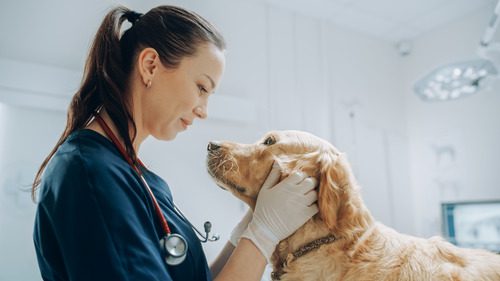Veterinarian Mental Health
The well-being of our veterinarians is a topic that deserves our attention. While they dedicate their lives to caring for our beloved animals, veterinarians often face unique challenges that can impact their mental health. Understanding these challenges is crucial for both veterinary professionals and the pet owners who rely on their expertise.

Understanding the Mental Health Challenges in Veterinary Medicine
Veterinarians encounter a range of stressors that can affect their mental well-being. Long working hours, high student debt, and the emotional toll of euthanasia procedures are just a few factors contributing to mental health struggles within the profession. A study reported by Merck Animal Health highlighted that approximately 1 in 20 veterinarians experience severe psychological distress, a rate comparable to the general population. However, younger veterinarians report higher levels of distress, with 8.7% of those aged 18 to 34 experiencing significant challenges. Financial burdens also play a significant role. Veterinarians with student debt report higher levels of distress, ranging from 9.2% to 11.3%, compared to 3% among those without debt. This financial strain, coupled with the demands of the profession, can lead to burnout, anxiety, and depression.
The Impact of Compassion Fatigue and Burnout
Compassion fatigue and burnout are prevalent issues in veterinary medicine. The constant exposure to animal suffering, coupled with the responsibility of making life-and-death decisions, can take an emotional toll. A survey from the Merck Animal Health veterinary well-being study revealed that 69% of veterinary technicians experience low to medium burnout levels, while 72% of veterinary team members report feelings of exhaustion. Burnout not only affects the individual but can also impact the quality of care provided to animals. It’s essential for veterinary professionals to recognize the signs of burnout and seek support when needed.
Barriers to Seeking Mental Health Support
Despite the high prevalence of mental health challenges, many veterinarians are hesitant to seek help. Stigma surrounding mental health within the profession can discourage individuals from reaching out. This reluctance can be attributed to concerns about professional reputation, fear of judgment, and a culture that often prioritizes resilience over vulnerability. Addressing these barriers is crucial to ensure that veterinarians receive the support they need.
Resources and Support for Veterinary Professionals
Several organizations are dedicated to supporting veterinarian mental health.
Not One More Vet (NOMV)
NOMV provides outreach, peer support, and educational resources to help veterinary professionals navigate mental health challenges. Additional resources include:
American Veterinary Medical Association
The American Veterinary Medical Association (AVMA) also offers a range of well-being resources, including tools for assessing well-being and strategies to improve workplace wellness.
Substance Abuse and Mental Health Services Administration
Additionally, the Substance Abuse and Mental Health Services Administration (SAMHSA) provides resources for mental health support, including the 988 Suicide & Crisis Lifeline, which offers 24/7, free, and confidential support for people in distress.
Why Veterinarian Mental Health Matters
Veterinarian mental health is not just an individual concern—it affects the entire animal care industry, pet owners, and the well-being of countless animals. A mentally healthy veterinarian is better equipped to provide high-quality, compassionate care to pets while maintaining strong communication and decision-making skills. However, when mental health struggles go unaddressed, they can lead to burnout, emotional exhaustion, and even workforce shortages in the veterinary field.
The Ripple Effect of Mental Health on Veterinary Care
The high rates of stress, depression, and anxiety among veterinarians have far-reaching implications. When a veterinarian struggles with their mental health, it can impact their ability to manage complex cases, empathize with clients, and sustain a long-term career in the profession. Studies indicate that veterinarians are at an increased risk for suicide compared to the general population, making mental health awareness and support even more urgent. The loss of a veterinary professional not only affects their colleagues and loved ones but also leaves a gap in animal healthcare services.
How Veterinarian Well-Being Affects Pet Owners
Beyond the personal impact, veterinarian mental health matters for pet owners as well. Veterinarians play a crucial role in maintaining the health and happiness of companion animals, and their ability to do so is influenced by their own well-being. When mental health support is prioritized in veterinary medicine, professionals are more likely to stay in the field, reducing staff shortages and ensuring that pet owners have continued access to trusted, experienced veterinary care.
Fostering a Culture of Mental Health Awareness
A focus on veterinarian mental health also strengthens the entire profession by fostering a culture of openness, understanding, and support. Breaking down the stigma associated with seeking mental health care encourages veterinary professionals to prioritize their well-being without fear of judgment. By investing in mental health resources, training, and peer support, the veterinary community can create a more sustainable and fulfilling career path for those who dedicate their lives to helping animals.
How Pet Owners Can Support Veterinarians
As pet owners, we can play a role in supporting the mental health of veterinarians.
- Understanding the challenges they face and approaching interactions with empathy can make a significant difference.
- Recognizing that veterinarians are human and acknowledging the emotional labor involved in their work fosters a more supportive environment.
- Providing positive feedback, being patient during consultations, and respecting their professional boundaries are simple yet effective ways to show support.
Veterinarian mental health is a critical issue that requires collective attention and action. When we begin to understand the challenges, support those in the profession, and promote a culture of well-being, we can ensure that our veterinarians continue to thrive while providing the best care for our beloved animals. For more information and resources, consider exploring the support offered by organizations like Not One More Vet and the American Veterinary Medical Association.
Recent Posts
About Us
NOMV addresses well-being in the veterinary medical community through evidence driven programming that raises awareness on mental health in the community while providing innovative prevention and intervention programming.
